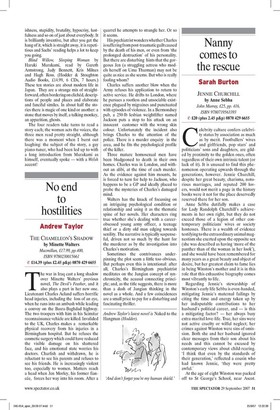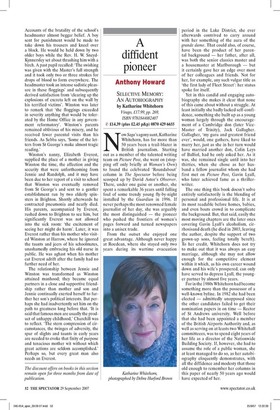Nanny comes to the rescue
Sarah Burton JENNIE CHURCHILL by Anne Sebba John Murray, £25, pp. 416, ISBN 9780719563393 £20 (plus 2.45 p&p) 0870 429 6655 Celebrity culture confers celebrity status by association as much as by merit. Footballers' wives and girlfriends, pop stars' and politicians' sons and daughters, are gilded by proximity to the golden ones, often regardless of their own intrinsic talent (or lack of it). It is unusual to find this phenomenon operating upwards through the generations, however. Jennie Churchill, despite her great beauty, charisma, notorious marriages, and reputed 200 lovers, would not merit a page in the history books were it not for the place deservedly reserved there for her son.
Anne Sebba dutifully makes a case for Lady Randolph Churchill's achievements in her own right, but they do not exceed those of a legion of other contemporary politicians' wives or society hostesses. There is a wealth of evidence testifying to the extraordinary animal magnestism she exerted upon the opposite sex (she was described as having 'more of the panther than of the woman in her look'), and she would have been remembered for many years as a great beauty and object of desire, but her greatest claim to fame lies in being Winston's mother and it is in this role that this exhaustive biography comes most vibrantly to life.
Regarding Jennie's stewardship of Winston's early life Sebba is even-handed, mitigating Jennie's maternal failings by citing the time and energy taken up by her indisputable contributions to her husband's political career, and — is this a mitigating factor? — her always busy extra-marital love-life. True, her sins were not active cruelty or wilful neglect; her crimes against Winston were sins of omission. Both she and her husband ignored clear messages from their son about his needs and this cannot be excused by contemporary views about child-rearing. 'I think that even by the standards of their generation,' reflected a cousin who had known Jennie, 'they were pretty awful.'
At the age of eight Winston was packed off to St George's School, near Ascot.
Accounts of the brutality of the school's headmaster almost beggar belief. A boy sent for punishment would be made to take down his trousers and kneel over a block. He would be held down by two older boys while the Rev. H. W. SneydKynnersley set about thrashing him with a birch. A past pupil recalled: 'The swishing was given with the Master's full strength and it took only two or three strokes for drops of blood to form everywhere. The headmaster took an intense sadistic pleasure in these floggings' and subsequently derived satisfaction from 'clearing up the explosions of excreta left on the wall by his terrified victims'. Winston was later to remark that 'the floggings exceeded in severity anything that would be tolerated by the Home Office in any government reformatory'. Winston's parents remained oblivious of his misery, and he received fewer parental visits than his friends. As Sebba says, 'Some of the letters from St George's make almost tragic reading.'
Winston's nanny, Elizabeth Everest, supplied the place of a mother in giving Winston the time, the affection and the security that were unforthcoming from Jennie and Randolph, and it may have been due to her report of a visit to school that Winston was eventually removed from St George's and sent to a gentler establishment run by two elderly spinsters in Brighton. Shortly afterwards he contracted pneumonia and nearly died. His parents, accompanied by Everest, rushed down to Brighton to see him, but significantly Everest was not allowed into the sick room: 'the excitement of seeing her might do harm'. Later, it was Everest rather than his mother who visited Winston at Harrow, where he ignored the taunts and jeers of his schoolmates, unashamedly embracing his old nurse in public. He was aghast when his mother cut Everest adrift after the family had no further need of her.
The relationship between Jennie and Winston was transformed as Winston attained manhood; they became equal partners in a close and supportive friendship rather than mother and son and Jennie continually exerted herself to further her son's political interests. But perhaps she had inadvertently set him on the path to greatness long before that. 'It is said that famous men are usually the product of unhappy childhood,' Churchill was to reflect. 'The stern compression of circumstances, the twinges of adversity, the spur of slights and taunts in early years are needed to evoke that fixity of purpose and tenacious mother wit without which great actions are seldom accomplished.' Perhaps so, but every great man also needs an Everest.
The discount offers on books in this section remain open for three months from date of publication.
























































 Previous page
Previous page